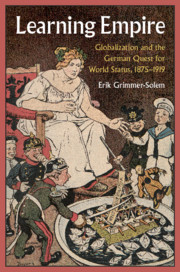Refine search
Actions for selected content:
4 results
Introduction
-
- Book:
- Learning Empire
- Published online:
- 20 September 2019
- Print publication:
- 26 September 2019, pp 1-26
-
- Chapter
- Export citation
Part III - Empire Lost, 1908–1919
-
- Book:
- Learning Empire
- Published online:
- 20 September 2019
- Print publication:
- 26 September 2019, pp 389-599
-
- Chapter
- Export citation
10 - World Policy Contained
- from Part III - Empire Lost, 1908–1919
-
- Book:
- Learning Empire
- Published online:
- 20 September 2019
- Print publication:
- 26 September 2019, pp 446-493
-
- Chapter
- Export citation

Learning Empire
- Globalization and the German Quest for World Status, 1875–1919
-
- Published online:
- 20 September 2019
- Print publication:
- 26 September 2019
